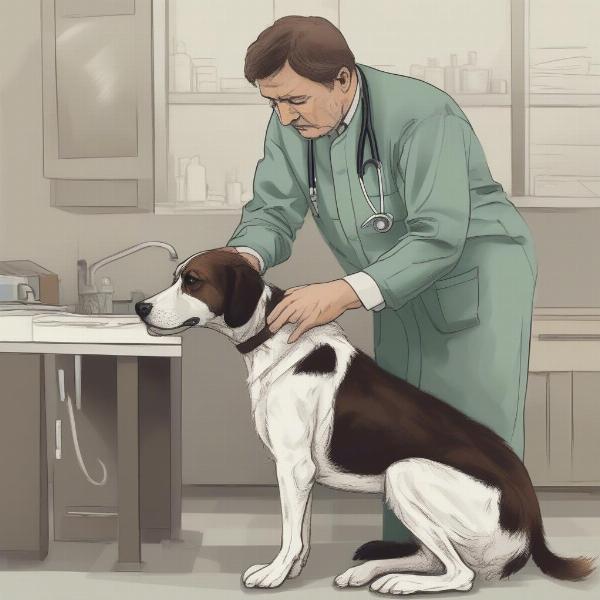The phrase “dog with slipped disc put to sleep” is a difficult one, laden with emotion and reflecting a painful choice faced by many dog owners. A slipped disc, medically known as Intervertebral Disc Disease (IVDD), can cause severe pain and even paralysis in dogs. While treatment is often successful, sometimes euthanasia becomes the most humane option. This article explores the factors influencing this difficult decision, offering support and guidance to those facing this heartbreaking scenario.
Understanding IVDD and Its Severity
IVDD occurs when the cushioning discs between the vertebrae of the spine degenerate, bulge, or rupture, putting pressure on the spinal cord. This can lead to pain, weakness, difficulty walking, and even paralysis. The severity of IVDD ranges from mild discomfort to complete loss of function. The decision to euthanize is typically made when a dog’s quality of life is significantly compromised and pain management is no longer effective.
When Euthanasia Becomes a Consideration
Euthanasia is a deeply personal decision, and there is no right or wrong answer. It’s essential to consult closely with your veterinarian to assess your dog’s specific situation. Factors to consider include the severity of the disc herniation, the dog’s neurological status, their response to treatment, and their overall quality of life.
Assessing Quality of Life
Quality of life is a crucial factor. Consider your dog’s ability to eat, drink, sleep, eliminate waste, and experience joy. Are they constantly in pain, even with medication? Are they unable to participate in activities they once enjoyed? Honest answers to these questions can help guide your decision.
 Veterinarian Assessing a Dog's Quality of Life
Veterinarian Assessing a Dog's Quality of Life
Exploring Treatment Options Before Euthanasia
Before making the difficult decision about euthanasia, it’s crucial to explore all available treatment options. These might include conservative management with pain medication, anti-inflammatory drugs, and strict rest, or surgical intervention to decompress the spinal cord.
Conservative Management
Conservative management can be effective for mild to moderate cases of IVDD. This involves pain management, strict cage rest, and physical therapy. Your vet will tailor a plan specific to your dog’s needs.
Surgical Intervention
In more severe cases, surgery may be necessary to remove the herniated disc material and relieve pressure on the spinal cord. Surgery can be successful, but it carries risks and requires a significant recovery period.
Coping with the Loss of a Beloved Pet
The decision to euthanize a pet is devastating. Allow yourself time to grieve and remember the joy your dog brought into your life. Support groups, pet loss hotlines, and online forums can provide comfort and understanding during this difficult time.
FAQ
- What are the signs of a slipped disc in a dog? Pain, weakness, difficulty walking, reluctance to jump or climb stairs, yelping when touched, and paralysis.
- Is surgery always the best option for IVDD? Not always. Conservative management can be effective for milder cases. Surgery is generally reserved for more severe cases.
- How long do dogs live after being diagnosed with IVDD? With proper treatment and management, many dogs can live long and happy lives. The prognosis depends on the severity of the condition and the individual dog.
- Is euthanasia painful for dogs? The procedure is designed to be peaceful and painless.
- How do I know when it’s the right time? This is a personal decision. Consult with your veterinarian and consider your dog’s quality of life.
- What resources are available for pet loss support? Pet loss hotlines, support groups, and online forums can provide comfort and guidance.
- How can I prevent IVDD in my dog? Maintaining a healthy weight, providing regular exercise, and using harnesses instead of collars can help reduce the risk.
Connecting You with More Helpful Resources
While we don’t currently have other articles specifically on this topic, you may find information on related conditions and dog health within our wider resources.
About ILM Dog
ILM Dog is your trusted international resource for comprehensive dog care information. We’re committed to providing dog owners with expert advice and practical tips on various aspects of dog ownership, including dog breeds, health and medical care, training, nutrition, grooming, exercise, and product recommendations. If you need support or further guidance regarding your dog’s health, our expert team is here to help. Contact us at [email protected] or +44 20-3965-8624 for personalized advice.